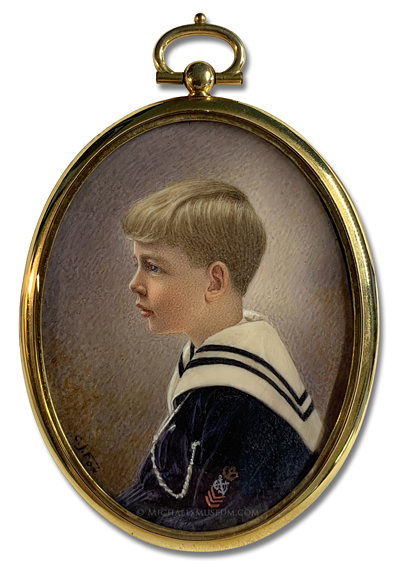| |
American Artist: Irving Isaac Resnikoff


Early Twentieth Century Boy
Wearing a Sailor Suit
American
circa 1930
by Irving Isaac Resnikoff (1896-1988),
under the pseudonym Charles J. Fox
(signed obverse, lower left edge, "C. J. Fox")
2 1/2 x 3 1/4 inches (sight)
watercolor on ivory; housed under glass in a gilt brass case
About the Artist: Despite having produced a large body of work, Irving Isaac Resnikoff lived a life of relative obscurity. Were it not for a scandalous court case, in which his employer was accused of tax evasion, the world might never have known that it was Resnikoff who painted hundreds of portraits under the pseudonym C. J. Fox.
The son of a butcher, Irving Isaac Resnikoff was born in 1896, in the small port town of Feodossia, along the Black Sea, in Crimea, Russia. As a young man, showing promising artistic talent, he was enrolled at the Imperial Academy of Arts, in St. Petersburg. There, he embraced modern art and, in particular, cubism, the abstract painting style pioneered by Pablo Picasso and Georges Braque.
Sometime during the Russian Revolution, after the Bolsheviks abolished the Imperial Academy of Arts, Resnikoff and his family (his widowed father and five siblings) left Russia and migrated south, to Constantinople (today Istanbul), Turkey. From there, they later emigrated to the United States, in 1923, and settled in New York City.
To his frustration, Resnikoff struggled to make a name for himself as a cubist painter in New York; and indeed, very few of his cubist/abstract works have survived to the twenty-first century. To support himself, therefore, the young, immigrant artist turned to portraiture. To this end, he became associated with an art dealer by the name of Leo Fox (1908-1979). The two developed a decades-long working relationship during which, behind the scenes, Resnikoff painted countless portraits of Fox's customers.
It is said that Resnikoff himself never met the subjects he painted. Rather, Fox provided him with photographs of the subjects from which Resnikoff then produced full-color portraits (both full-sized and in miniature), all upon which he dutifully inscribed the pseudonym signature, "C. J. Fox". Resnikoff was paid a fee for each portrait painted; and Fox, in turn, earned a profit when he sold each portrait for a higher price to his end customers.
Over the years, many of Fox's customers surely thought that it was he himself who painted their portraits, as he never disclosed to them his association with Resnikoff; and, interestingly, details of his working arrangement with Resnikoff might never have come to light were Fox not charged with tax evasion in 1978.
In its case against him, the I.R.S. argued that Fox had underreported his income for several years and owed $40,000 in unpaid back taxes. Fox, in turn, argued that he operated as a corporation rather than as an individual artist and that he was, therefore, subject to a lower tax rate. In support of his argument, he testified that he himself could not paint, and he provided evidence that it was, in fact, Resnikoff who, over the course of at least four decades, painted portraits bearing the signature "C. J. Fox". For his part, Resnikoff acknowledged the arrangement and provided an affidavit confirming his working relationship with Leo Fox. He otherwise remained quiet, however, and gave no public explanation as to why he never sought recognition for the portraits he painted.
Notable subjects painted by Resnikoff under the C. J. Fox pseudonym include President John F. Kennedy and numerous U.S. senators and congressmen. His works are represented in several private collections and numerous portraits by him hang in the halls of American government.
|
|